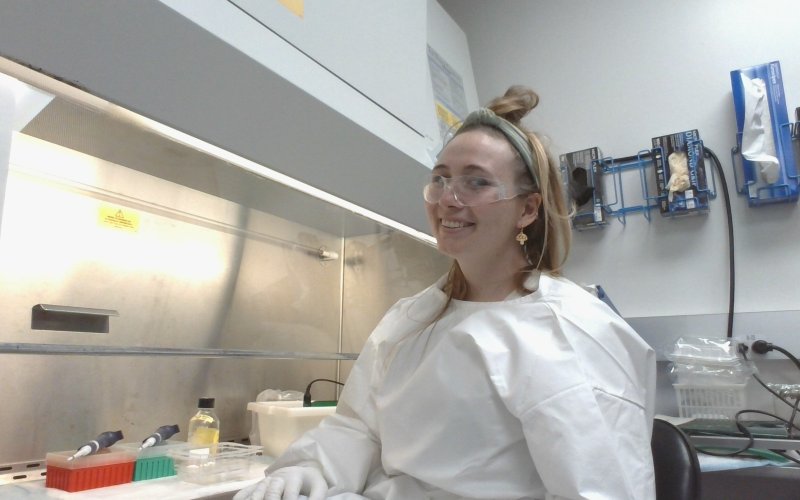Biomedical Sciences Student Receives Prestigious F31 Grant

ALBANY, N.Y. (May 15, 2024) - Rachel Lange, a 4th year PhD candidate in the Arbovirus Laboratory directed by Alex Ciota, has been awarded a prestigious F31 grant from the National Institute of Allergy and Infectious Diseases (NIAID). Her project, titled “Investigating genetic correlates of host-specificity and potential for further adaptation of Powassan Virus,” is a significant step forward in our understanding of the genetic factors influencing the host specificity of the emergent Powassan Virus Lineage II isolates. This research holds great promise for enhancing our ability to predict and manage the potential for further adaptation of these viruses to distinct tick hosts.
Lange's journey into the world of virology and entomology began during her undergraduate years at SUNY ESF in Syracuse, NY. It was there, while collecting ticks with a makeshift vacuum, that she discovered her fascination with these tiny creatures and the viruses they carry. This passion led her to the Department of Biomedical Sciences at UAlbany, where she had the opportunity to work directly at a public health institution under the guidance of Alex Ciota.
Before receiving the F31 grant, Lange's work at UAlbany was focused on fieldwork and characterizing new Powassan, Heartland, and Bourbon virus strains detected through surveillance, laying the groundwork for her current research.
Her current research focuses on Powassan virus and understanding the current landscape of emergent tick-borne viruses in the Northeast. She uses surveillance data and samples with experimental work to investigate the genetic and phenotypic diversity of these viruses and their potential to spillover and adapt to noncanonical tick hosts. With this F31 grant, Lange will determine whether specific emergent mutations in Powassan virus confer increased viral fitness in noncanonical hosts. In other words, it will assess if these mutations emerged through positive selection and why they are advantageous in specific tick species. Additionally, the grant will focus on taking an experimental evolution approach, in which Powassan virus will be introduced into different tick species multiple times and evaluated for species-specific adaptation.
With this research, Lange hopes to acquire new skills and techniques during the process. In addition to learning about federal funding systems and the independent project design process through the F31 grant application process, she aims to further her skills in molecular biology by creating infectious clones and expanding her entomological techniques by managing and processing various tick species. Ultimately, the Biomedical Sciences program at UAlbany and the F31 grant will set her up for her career goals in emerging virology with a public health focus.
A note from Lange about her research and F31 grant writing:
“I’d like to add a giant thank you to everyone in my mentorship circle! It truly takes a village and there are so many people that helped make this work possible, gave feedback, emotional support, read endless drafts, and everything in between! I’d like to say a specific thank you to Alex Ciota and Alan Dupuis who are my partners in crime and acted as my sponsors on this grant. None of this would be possible without Melissa Prusinski who coordinates and conducts tick surveillance across the state – the reason we can even explore questions about these viruses is because of all her hard work! I also owe so much gratitude to Jan Conn, Lili Kuo in the Arbovirus Lab, Cara Pager at UAlbany, Greg Ebel at Colorado State University, and Brian Leydet at SUNY ESF who not only submitted letters of support but helped at every step of the way (even with the tears that came from the rejection of the first submission, which Gary Winslow [emeritus SUNY Upstate] also deserves a shoutout for!). Last thank you goes to our very own Kayla Simanek and Jon Paczkowski who spent countless hours with me writing, revising, and submitting despite being bacteria lovers!”
Read Lange’s publications related to this work:
- Direct Evidence of Powassan Virus Vertical Transmission in Ixodes scapularis in Nature (RE Lange, AP Dupuis, MA Prusinski, AT Ciota. Microorganisms 11(6), 1590)
- Identification and characterization of novel lineage 1 Powassan virus strains in New York State (RE Lange et al. Emerging Microbes & Infections 12(1), 2155585)
- Diversification of Bourbon Virus in New York State (RE Lange, AP Dupuis II, AT Ciota. Microorganisms 11(6), 1590)
- Emerging tickborne viruses vectored by Amblyomma americanum (Ixodida: Ixodidae): Heartland and Bourbon viruses (AP Dupuis II, RE Lange, AT Ciota. Journal of Medical Entomology 60(6), 1183-1196



